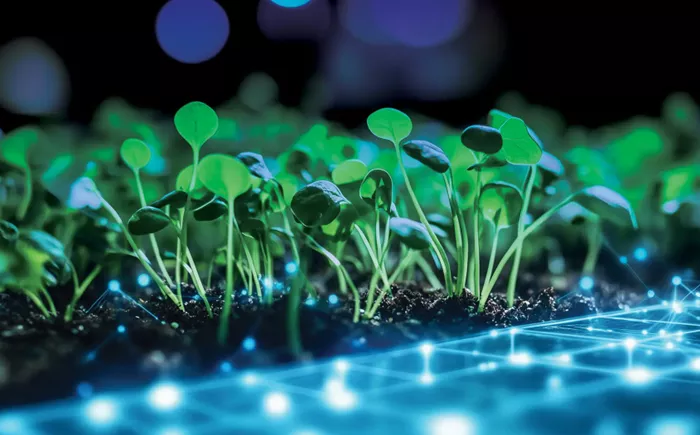New Food Production Method Enables Plants to Grow in the Dark.
Bioengineers have introduced a groundbreaking food production method that enables plants to thrive in darkness. This innovative approach, known as electro-agriculture, is said to be more efficient than traditional photosynthesis and could significantly enhance sustainability while aiding in ecosystem restoration.
Robert Jinkerson, a biological engineer at the University of California, Riverside, and electrochemist Feng Jiao from the University of Washington in St. Louis, estimate that this method could reduce agricultural land use by up to 94%.
Jinkerson explained, “If we no longer need sunlight to grow plants, we can separate agriculture from traditional environments and cultivate food in controlled indoor spaces.” This technique could also be applied to food production in space.
Currently, agriculture occupies half of the land in the United States. The implementation of electro-agriculture could potentially free up around 1 billion acres for other uses.
While photosynthesis only utilizes about 1% of the solar energy that plants absorb, electro-agriculture employs genetically modified plants that consume an organic molecule called acetate, which is similar to vinegar. This acetate is produced through a solar-powered chemical reaction that converts carbon dioxide (CO2) more efficiently. Scientists are tapping into a natural pathway that allows germinating plants to metabolize stored food from seeds, a process that typically shuts down once photosynthesis begins.
Jinkerson remarked, “Mushrooms, yeast, and algae can already be cultivated this way. I believe these applications will be commercialized first, with traditional plants following later.”
Solar energy for this process would be harnessed from panels placed on or near multi-story buildings, while the plants would be grown hydroponically. Jinkerson added, “Our goal is to reactivate this pathway in adult plants, allowing them to utilize acetate again. It’s similar to lactose intolerance in humans—while infants can digest lactose, many people lose that ability as they grow. We aim to achieve something similar for plants.”
According to Jiao, this new method is already four times more efficient than photosynthesis, with expectations for further improvements. “This is just the beginning of our research, and we hope to significantly enhance its efficiency and cost-effectiveness soon,” Jiao said.
Agricultural Update: Rising Egg Prices and E. Coli Concerns
In other agricultural news, egg prices are rising again as the holiday baking season approaches, largely due to the ongoing impact of bird flu, according to NerdWallet.
In January 2023, the price of eggs reached $4.82 per dozen following a drop in production due to bird flu. While prices initially decreased, they climbed to $3.82 per dozen in September, reflecting an 8.4% increase from August and a 39.6% rise from the previous year. In contrast, prices for other food items have only increased by 2.3% over the same period.
Meanwhile, egg marketing practices are facing scrutiny. A proposed class-action lawsuit in Chicago accuses Eggland’s Best of misleading consumers with packaging that suggests their hens are “free to roam in a pleasant, natural environment.” The lawsuit claims that many of Eggland’s hens are kept in windowless concrete buildings. Eggland has defended its labeling, stating that its eggs are indeed “cage free.”
In a separate development, fast-food chains have removed fresh onions from their menus due to a recent E. coli outbreak linked to McDonald’s. This outbreak prompted the company to temporarily pull its Quarter Pounders from 20% of its restaurants.
Attorney Mike Taylor of STOP Foodborne Illness noted that preventing contamination in produce is much more challenging than in meat, primarily because much of the produce is consumed raw. He explained that crops are often grown near wildlife and agricultural animals that can carry E. coli. Additionally, untreated manure or contaminated irrigation water can lead to contamination.
The Food Institute Podcast
Restaurant performance for the second quarter was underwhelming; however, eating remains a necessity for consumers. Circana Senior Vice President David Portalatin joined The Food Institute Podcast to discuss the current landscape of restaurant customers in light of the growing trend towards home-centric dining experiences.
Related topics:
- Kikwetu Flowers: More Than Premium Roses—A Commitment to Sustainability and Social Welfare
- Diwali 2024: Inspiring Ideas to Transform Leftover Puja Flowers into Beautiful Creations
- Beyond Sales: How Pilsen Flower Shops Celebrate Community with Día De Los Muertos Marigolds


